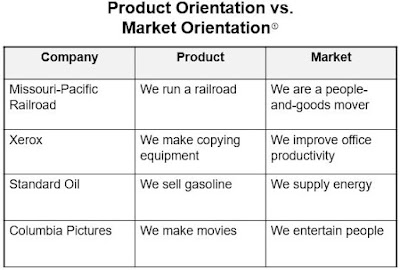Overview
There are two marketing strategies discussed in
this article. Product Orientation and Market
Orientation. These two marketing
strategies impact the company directly because the organization is built around
the support of one of these two strategies to optimize operations successfully.
Product Orientation
When marketing a product using product orientation
the emphasis is placed upon the product itself and how it is differentiated
from competing products. Therefore, a
company oriented in such a manner places it resources in such a way as to
ensure its expertise, information and systems are focused accordingly. That is, in supporting the success of the
product by whatever measures are appropriate.
This could mean fast delivery, rapid warranty action, continuous development
of periodic improvements, and easy access to instructional information. We can expect to see company investments in
developing its product, testing to ensure product performance and enrichment,
and the centering of its efforts to ensure the product performs throughout its
designed lifecycle.
Marketing Orientation
When marketing a product using a market orientation
the emphasis is placed on an appealing attribute in the market. When a company is so oriented, its expertise,
information and systems are built to ensure that all customers (seen as its market)
is satisfied. This could mean a company
being a low price provider, having fast product preparation, ensuring ease of product
use or consumption, providing high availability and easy access. We can expect to see the company investing in
researching market demand, and conducting thorough market testing and changing
consumer trends while also preparing for complete customer support and
interaction.
Table 1, Product Orientation vs. Market Orientation
Transfer of Marketing
Strategies
We can also expect the passing of time to
change a company’s focus and move from one marketing orientation to another. For instance, a fast food restaurant can
start up on a product orientation then find it necessary to transform its
strategy to a market orientation as the brand develops into a sustainable restaurant
chain. All of a sudden the number of variables
to its success grow exponentially causing the company to scan a broader
business landscape and horizon. This is
the desirable result of growth and management needs to keep open and flexible
during this time of transition.
Insightfully
yours,
Robert Majdak Sr, Co-Founder
Crystal Majdak, Co-Founder
References
Kottler
& Keller. (2011) Product Orientation vs. Market Orientation (Powerpoint).
Pearson Education. Prentice Hall


No comments:
Post a Comment